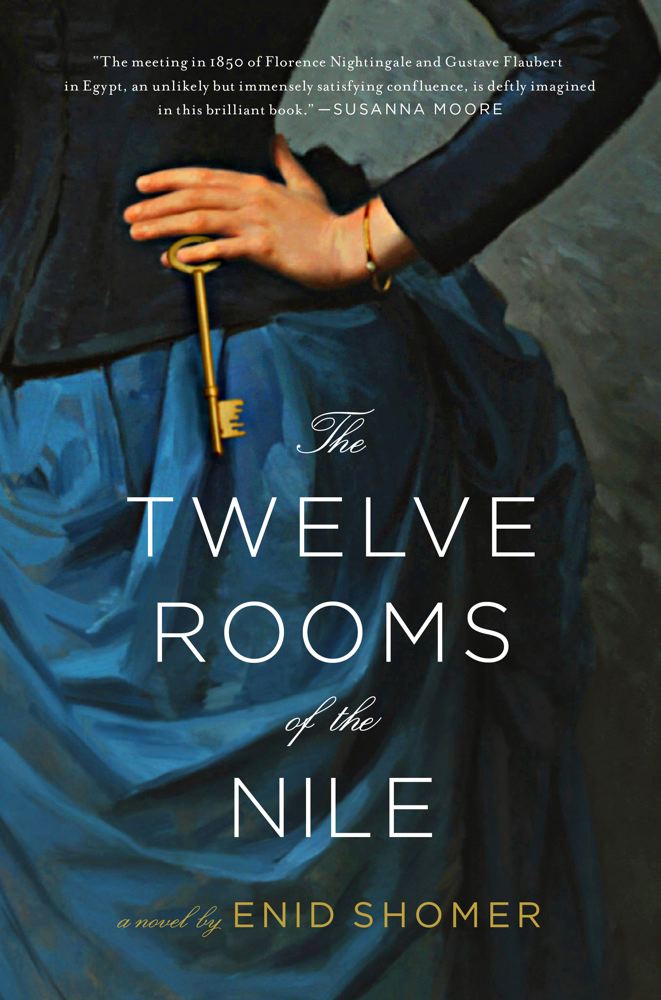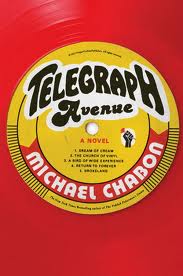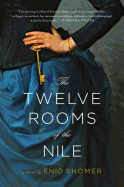 Enid Shomer has written four books of poetry and two short story collections (including Tourist Season). Now in her early 60s, she's published her first novel, The Twelve Rooms of the Nile. It's an entrancing story about a meeting between two famous people before they were famous (and who never actually met).
Enid Shomer has written four books of poetry and two short story collections (including Tourist Season). Now in her early 60s, she's published her first novel, The Twelve Rooms of the Nile. It's an entrancing story about a meeting between two famous people before they were famous (and who never actually met).
Egypt, 1849: The frustrated, cynical Gustave Flaubert is on a Nile cruise; so is an idealistic woman afflicted with desespoir named Florence Nightingale. Accompanying Flaubert is his good friend Maxime De Camp, excitedly photographing artifacts while Flaubert collects rubbings for him. With Flo is Trout, her maid, who carries around her waist a large key, a reminder of her lover in England.
There's no mystery to solve here or disaster for Flaubert and Nightingale to overcome together, just a delicate and slow unwinding of their powerful, complex personalities as they discuss their hopes with each other while climbing pyramids, crossing the Sahara and visiting the Red Sea. (Flaubert even gets trapped in a cave.) In some ways, The Twelve Rooms of the Nile is an epistolary novel, so important are the personal and reflective letters the two send each other by courier. Flaubert is at first "your humble servant" then "your friend" and she his Rossignal, then "my dear songbird." He keeps a memoir about his favorite prostitutes' private parts, the "sweet gift package in the declivity below," while she (like Flaubert's saint in his failed book, The Temptation of St. Antony) agonizes over how she can best devote her life--how she, a woman, can fulfill herself. He wonders how he could be like her, understand her "goodness," reconcile it "with his dissipated ways." How could he be the "rebel," the "revolutionary," that she is?
Shomer conducted prodigious amounts of research to re-create this Victorian world and to provide authentic portraits of these two giants of their era. But she wears that research lightly, as Shomer the poet also provides us with a lush prose, here and there just the right word, like Flaubert's own search as a writer for "le mot juste." In the end, as with Temptation, for which Flaubert conducted a "hellish amount of research" to write a novel in which "nothing happens," the "precise, lyrical language" and "driving rhythms" of The Twelve Rooms of the Nile creates a subtle, "palpable depiction" of the internal torments suffered by two geniuses. --Tom Lavoie
Shelf Talker: A luscious historical novel that creates a fascinating literary voyage into the minds of two great figures of the Victorian era.
 "Every generation rewrites the book's epitaph; all that changes is the whodunit.... However the terms change, in these visions, the place where books are read, acquired or received remains constant. Even that most cinematic of novels, A Clockwork Orange, begins and ends in the Public Biblio. Writers foresaw space travel, time travel, virtual reality and, endlessly, the book's demise; what they never seem to have imagined was that the libraries housing those dying volumes might themselves disappear. After a year in which 2,600 public library branches cut back their hours, some readers will need to walk a lot farther than the length of a street. I'm still waiting for the public library aeroplane."
"Every generation rewrites the book's epitaph; all that changes is the whodunit.... However the terms change, in these visions, the place where books are read, acquired or received remains constant. Even that most cinematic of novels, A Clockwork Orange, begins and ends in the Public Biblio. Writers foresaw space travel, time travel, virtual reality and, endlessly, the book's demise; what they never seem to have imagined was that the libraries housing those dying volumes might themselves disappear. After a year in which 2,600 public library branches cut back their hours, some readers will need to walk a lot farther than the length of a street. I'm still waiting for the public library aeroplane."


SHELFAWARENESS.1222.S1.BESTADSWEBINAR.gif)


SHELFAWARENESS.1222.T1.BESTADSWEBINAR.gif)

 It all began Friday when Pat Garrard purchased a first edition of Elmore Leonard's The Bounty Hunter for $850, launching the "
It all began Friday when Pat Garrard purchased a first edition of Elmore Leonard's The Bounty Hunter for $850, launching the " Recent price cuts by Amazon and Barnes & Noble on their tablet lines are being interpreted as a sign that the release of the much-anticipated new Kindles may be imminent. Gizmodo reported that when "bargain hounds" opened their Amazon Deal of the Day e-mail Friday "they were met with a
Recent price cuts by Amazon and Barnes & Noble on their tablet lines are being interpreted as a sign that the release of the much-anticipated new Kindles may be imminent. Gizmodo reported that when "bargain hounds" opened their Amazon Deal of the Day e-mail Friday "they were met with a  As part of an ambitious promotional campaign for Michael Chabon's upcoming novel Telegraph Avenue, Harper's marketing team will convert Oakland bookshop DIESEL into a
As part of an ambitious promotional campaign for Michael Chabon's upcoming novel Telegraph Avenue, Harper's marketing team will convert Oakland bookshop DIESEL into a 
 Recovering from recent ankle surgery, crime novelist Robert Crais was taking a walk in the Hollywood Hills when he saw this amazing garage door. Being a book person, he HAD to take a picture--and
Recovering from recent ankle surgery, crime novelist Robert Crais was taking a walk in the Hollywood Hills when he saw this amazing garage door. Being a book person, he HAD to take a picture--and  Last week at dinner after an event at
Last week at dinner after an event at  Congratulations to Shawn Wathen, co-owner of
Congratulations to Shawn Wathen, co-owner of  Fox has purchased
Fox has purchased  Enid Shomer has written four books of poetry and two short story collections (including Tourist Season). Now in her early 60s, she's published her first novel, The Twelve Rooms of the Nile. It's an entrancing story about a meeting between two famous people before they were famous (and who never actually met).
Enid Shomer has written four books of poetry and two short story collections (including Tourist Season). Now in her early 60s, she's published her first novel, The Twelve Rooms of the Nile. It's an entrancing story about a meeting between two famous people before they were famous (and who never actually met).